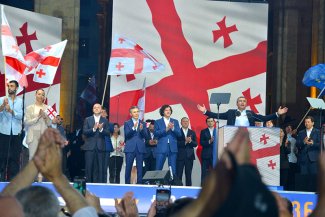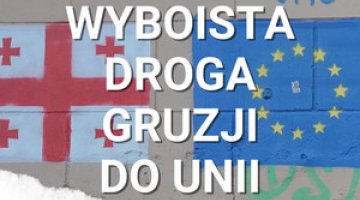A Journey into a glorious past: three terms of Georgian Dream

The 12 years of Georgian Dream (GD) rule have been marked by a series of successes in terms of political effectiveness and tangible achievements. The party has won parliamentary and local elections three times, and candidates backed by Georgian Dream have twice secured the presidency. Polls predict that in the forthcoming parliamentary elections on 26 October, Georgian Dream will once again secure the most votes. Under the governance of this party, Georgia signed an association agreement with the European Union, Georgian citizens were granted visa-free travel to the Schengen Area, and in December 2023, the country obtained EU candidate status.
However, over time, the party’s actions have increasingly polarised society, as evidenced by mass street protests. Anti-Western statements and initiatives by Georgian Dream politicians, including its leader, billionaire Bidzina Ivanishvili, and violations of democratic principles have significantly strained Georgia’s relations with the West. These paradoxes stem from the party’s evolution – as Georgian Dream has consolidated its power, its policies have become increasingly assertive and aggressive towards the opposition and the West, adopting traits characteristic of Putin’s pseudo-conservatism. Today, despite its declarations, the party has become an anti-Western and anti-reformist force, striving to gain full control of the state. Its continued rule could also result in a hard irreversible pro-Russian shift in Tbilisi’s politics.
The oligarch’s dream comes true
The Georgian Dream party (officially Georgian Dream – Democratic Georgia) was founded in the spring of 2012 by oligarch Bidzina Ivanishvili, Georgia’s richest man, who had previously lived abroad and amassed his fortune in Russia in the 1990s.[1] Upon returning to Georgia, Ivanishvili declared that he had divested all his Russian interests, but the opposition continues to accuse him of maintaining business ties with the country. These allegations have intensified since Russia invaded Ukraine, as Georgia has not supported anti-Russian sanctions, with evidence suggesting it may be facilitating their circumvention.[2]
Ivanishvili has remained the undisputed leader of Georgian Dream and the sole decision-maker regarding key nominations, even though he formally withdrew from politics at one point. During that period, he led the party (and the country) ‘from behind the scenes’. However, in the upcoming elections, he will be the lead candidate on Georgia Dream’s list for the first time, highlighting the importance of these elections for both the party and Georgia’s future.
Several factors contributed to Georgia Dream’s first electoral victory on 1 October 2012. The decisive factor was the oligarch’s wealth, which enabled him to build the party in just six months. Another crucial factor was the public’s growing fatigue with nearly a decade of President Mikheil Saakashvili’s rule, which was becoming increasingly authoritarian. A defining moment symbolising this shift occurred when cases of torture in one of Georgia’s prisons were exposed.[3]
Another factor contributing to the victory of the newly-formed Georgian Dream was its political manifesto. Initially, Georgian Dream did not reject the achievements of Saakashvili’s camp and pledged to continue the main tenets of his policies, which involved strengthening ties with the West and implementing liberal economic reforms, albeit with some significant adjustments. This approach aligned with the expectations of many Georgians, including politicians who supported a free market and the country’s integration with the EU (around 80% of respondents support EU accession). However, they opposed unrestrained capitalism, social stratification, the indiscriminate rejection of the Soviet legacy, unconditional subordination to Brussels and Washington, and comprehensive Westernisation, particularly in relation to moral and cultural values, with approximately 50% of respondents identifying as highly religious.[4] These sentiments were also reflected in Ivanishvili’s charitable initiatives, including his support for the Georgian Orthodox Church.[5] Paradoxically, the defeat of Saakashvili’s party, the United National Movement (UNM), was a success for the president, as it demonstrated that he had built a political system where a peaceful transfer of power through elections was possible.
Georgian Dream participated in the 2012 elections as part of a broad coalition that included parties formed by politicians previously affiliated with Saakashvili. Their presence was intended to reassure Western governments and the Georgian public that there would be no fundamental shift in the country’s development path. In the first Georgian Dream government, Irakli Alasania, who had served as an ambassador to the UN under Saakashvili, was appointed Deputy Prime Minister and Defence Minister.[6] Bidzina Ivanishvili became Prime Minister and held the position for a year. He stepped down after Saakashvili’s term ended (the president left the country), and following the presidential election won by Georgian Dream nominee Giorgi Margvelashvili.[7] In 2014, the party triumphed in local elections, consolidating its hold on power, and the coalition began to disintegrate. Georgian Dream’s dominance on the Georgian political scene was further confirmed in the 2016 parliamentary elections. This time, the party ran independently and won 115 out of 150 seats in parliament, securing a constitutional majority.
Parting ways with democracy...
The opposition’s fears that, under Georgian Dream, the country would reorient its foreign policy and move away from its pro-Western trajectory did not materialise in the early years. Such concerns were fuelled by Ivanishvili’s speculations about integrating with the Eurasian Economic Community (later the Eurasian Economic Union),[8] and his suggestions that Saakashvili’s government was partly responsible for the outbreak of the war with Russia in 2008,[9] as well as the gradual marginalisation of the most pro-European politicians from the coalition parties within the ruling bloc. Despite this, in 2014, Georgia signed an Association Agreement with the European Union, along with a Deep and Comprehensive Free Trade Area (AA/DCFTA), which became effective in 2016. Additionally, in 2017, the EU lifted the visa requirement for Georgian citizens entering the Schengen Area for short stays.
Concerns about the future of Georgian democracy, expressed by the opposition and later by Western representatives, proved to be more justified. Upon coming to power, the Georgian Dream government initiated a campaign against the opposition, utilising both legal measures and informal pressure. During the first 100 days of Georgian Dream’s rule, prosecutors and tax authorities reportedly summoned several thousand officials and local government representatives associated with the United National Movement. Some were pressured to resign or join the victorious political camp.[10]
In the following months, criminal cases were initiated against officials for abuse of power as part of a ‘selective justice’ campaign – a practice for which the previous administration had been sharply criticised. Several of Saakashvili’s closest associates, including former Minister of Internal Affairs, Vano Merabishvili, were imprisoned. On 2 August 2014, a Tbilisi court ordered Saakashvili’s arrest, although he was already abroad at that time. He was charged with abuse of power and involvement in the internal troops’ raid on the opposition TV station Imedi, and ordering a violent attack on an opposition MP. The first prison sentence without parole for the former president, handed down in absentia in January 2018, was widely perceived as political revenge, irrespective of the evidence presented.[11]
In the lead up to the 2016 elections, the government intensified its campaign against the opposition, particularly targeting the UNM. This involved the release of compromising materials against the former ruling team, including public screenings of footage depicting instances of torture. Additionally, some opposition party offices were attacked by unidentified perpetrators. At the time, Prime Minister Irakli Garibashvili declared that the UNM was a “criminal organisation” and that it was “natural” for the “Georgian people to feel angry” with the former government. Furthermore, a Tbilisi court froze the assets of the opposition-aligned Rustavi 2 TV station at the request of its former owner, who had ties to Georgian Dream. An investigation was also launched into an alleged coup attempt by individuals linked to former president Saakashvili.[12] The aim of this campaign was not only to intimidate and discredit the opposition and independent circles, undermining fair political competition, but also to consolidate Georgian Dream’s voter base. Furthermore, the government sought to gain voter support through social transfers and increased public sector salaries.
A defining feature of the political system that took shape in Georgia under the rule of Georgian Dream was the emergence of a non-transparent and informal ‘vertical’ decision-making structure that operated in parallel to official state institutions. After Ivanishvili stepped down as prime minister and formally left politics (between 2013 and 2018, he was officially a private citizen), the new prime minister became the nominal leader. However, it was widely known that the prime minister was effectively subordinate to Ivanishvili, the founder of Georgian Dream. Irakli Garibashvili, who served as prime minister from 2013 to 2015 and again from 2021 to 2024, commenced his career in Ivanishvili’s companies, where he was quickly promoted to executive positions. Another Georgian Dream politician, Vakhtang Gomelauri, the incumbent interior minister (since 2019), previously served as Ivanishvili’s bodyguard.
Ivanishvili, who has effectively governed Georgia since then, has remained beyond any democratic accountability throughout this period, despite once again serving as the party’s president between 2018 and 2021 and holding the position of honorary chairman since the end of 2023. He governs the country by exerting control over politicians who are dependent on him. Over time, as Georgian Dream secured successive electoral victories – winning parliamentary elections for the third time in 2020, local elections in 2017 and 2021, and the 2018 presidential election with their candidate Salome Zourabichvili – the system became entrenched. An increasing number of officials and public servants became Georgian Dream appointees, reinforcing a network of clientelism and mutual dependencies. This system has only strengthened over the years.
...and with the West
When Georgia’s Association Agreement with the EU entered into force and the visa-free regime for Georgian citizens travelling to the Schengen Area was introduced, the objectives of the Eastern Partnership were essentially fulfilled. The Eastern Partnership initiative had been designed to bring the most pro-Western post-Soviet states closer to the EU, though without offering them the prospect of membership.[13] In these circumstances, Brussels found itself lacking both the ‘stick’ and the ‘carrot’ in its relations with Tbilisi. As a result, the EU was left with little leverage, only able to highlight instances of human rights violations and the stalling of reforms.
The situation changed during Georgian Dream’s third term, which began in 2020. The ruling party won 91 seats, 24 fewer than in the previous election. However, the main opposition forces, led by the UNM, refused to accept the results, expressing their protest by boycotting the second round of elections and subsequently abstained from participating in parliamentary proceedings. According to the OSCE, the elections were free and competitive, but the “blurring of the line between the ruling party and the state” reduced public confidence in some aspects of the electoral process.[14] The months-long deadlock was eventually resolved by an agreement between political forces in April 2021, brokered by the European Council President, Charles Michel, who played an active role in the political process in Georgia. However, three months later, Georgian Dream withdrew from the agreement, triggering an ongoing and deepening crisis in Georgia’s relations with the West.[15]
Provoking conflicts with the West, while maintaining formal aspirations for integration with the EU and NATO, became a deliberate tactic of Georgian Dream to balance the Georgian public’s pro-Western desires with their conservative sensibilities. This Georgian conservatism is something the government has capitalised on for a long time. The strategic goal was to strengthen Georgian Dream’s position and remain in power. It is worth noting that in May 2021, Georgia, Ukraine, and Moldova formed the ‘Associated Trio’ to deepen cooperation towards EU accession. However, by July, violence broke out in Tbilisi against organisers and presumed participants of a planned LGBT march, with 60 journalists among the victims. The attackers were linked to the Georgian Orthodox Church, and the acts were condemned by the West. Georgian Dream’s hard stance against Brussels and Washington positioned the party as defenders of ‘traditional values,’ sending the message that “the West doesn’t want us because we remain true to ourselves”.[16] Towards the end of 2021, just before another Georgian Dream victory in local elections, former president Mikheil Saakashvili illegally returned to Georgia. He was subsequently arrested due to outstanding court sentences and remains in detention to this day.[17]
According to the European Parliament’s report, published in March 2022, assessing the implementation of the EU-Georgia Association Agreement from 2020 to 2022, there had been a regression in democratic reforms in Georgia, with examples including the arrests of opposition leaders.[18] Despite this assessment and Georgia’s ambiguous stance on the Russian invasion of Ukraine, the country’s integration with the EU was accelerated. At the European Council summit on 23 June 2022, Georgia was granted a ‘European perspective’. Moldova and Ukraine had already been granted candidate status, but in the case of Georgia, the EU made this conditional on fulfilling recommendations in 12 areas. By June 2023, the European Commission acknowledged that Georgia had fully met only three recommendations, partially fulfilled seven, and inadequately addressed one. Nevertheless, it still recommended that the EU Council grant Georgia candidate status, which was formalised on 14 December. Thus, the EU recognised Georgia’s longstanding efforts towards Western integration and the pro-European sentiment predominant among the Georgian public. However, the key factor was the geopolitical climate during the conflict, which created a ‘window of opportunity’ for EU enlargement.
Regardless of Georgia’s candidate status, accession talks seem unlikely to be initiated in the near future. On 28 May 2024, the Georgian parliament passed the “Law on Transparency of Foreign Influence”, also referred to as the “foreign agent law” (mirroring a similar Russian law). This legislation requires entities, including NGOs and media outlets, to register if they receive a specified level of foreign funding. The law passed despite massive street protests involving hundreds of thousands of people and strong opposition from Western governments and organisations.[19] Consequently, relations between Tbilisi and the West have effectively been frozen. The EU, for instance, suspended the transfer of €30 million in support via the European Peace Facility (EPF), while the US imposed visa restrictions on dozens of Georgian Dream politicians and representatives of law enforcement agencies, and withdrew its participation from the annual Noble Partner military exercises with Georgia.[20]
Full speed backward: a new deal with Moscow and the end of democracy?
The opposition accused Georgian Dream and Ivanishvili of seeking a pro-Russian shift in Georgia’s foreign policy as early as 2012. The question of whether these claims are reasonable resurfaced following Russia’s invasion of Ukraine. Georgia’s ‘benevolent neutrality’ towards the aggressor, partly attributed to fears of Russian threats and Saakashvili’s ties to Ukraine (he holds citizenship there), effectively translated into support for Moscow. The resumption of air traffic between Georgia and Russia in May 2023 held significant symbolic meaning.[21] Simultaneously, Tbilisi began strengthening its relations with China.[22]
As the Georgian parliament passed the ‘foreign agents’ law, Russian politicians praised it, calling it a manifestation of Georgia’s independence.[23] Tbilisi’s drift towards Moscow became evident, although signs of this process had emerged earlier. One such sign was the recurring phrase used by Georgian Dream politicians since the onset of Russia’s invasion of Ukraine, referring to a ‘global war party’ that seeks to embroil Georgia in confrontation with Russia, contrary to Georgian interests. They claimed that the Georgian opposition, mainly the UNM, were allegedly local agents of this ‘party’. At present, Georgian Dream can be characterised as an anti-Western and anti-reformist force, and the ‘conservative project’ it has been pushing aligns perfectly with the cultural and civilisational narrative of the Kremlin.[24] It remains uncertain whether this indicates a willingness to abandon the path towards the West and forge a lasting bond with Moscow, or whether it is merely a tactical move to gain greater room for manoeuvre.[25] However, the former scenario is becoming increasingly plausible.
If Georgia reaches an agreement with Russia, it might regain Abkhazia and South Ossetia (officially: the Tskhinvali region) in some form, but the entire country would fall under the Russian ‘umbrella’. Ivanishvili’s statement about the need to ‘apologise’ to the people of South Ossetia for attacking their region in 2008, which served as a pretext for Russia’s invasion of Georgia,[26] might suggest that discussions are heading in this direction. However, these remain mere speculations for the time being, as Prime Minister Irakli Kobakhidze emphasises that Russian troops must be withdrawn from the separatist regions, a demand Moscow is unlikely to agree to.
The parliamentary elections on 26 October are crucial for the country’s future. According to polls, Georgian Dream is still poised to garner the highest support, with an estimated 32–35% of vote, while the United National Movement is projected to receive around 20%. This is largely due to Georgian Dream being associated with stability and economic growth, which has been achieved over the past two years, partly due to relations with Russia and an influx of migrants from that country (during Georgian Dream’s tenure, Georgia’s GDP nearly doubled, increasing from $16.89 billion to $30.54 billion). However, the combined polling results of the four opposition blocs are almost twice as high.[27] What remains uncertain at present is whether the opposition is prepared to unite (all previous attempts have been unsuccessful) and how determined Georgian Dream is to maintain its hold on power.
If Georgian Dream wins the election, especially if it secures a constitutional majority, the country would likely shift away from Western integration and continue building closer ties with Russia. Thus, the current political system will become entrenched, the political opposition will be practically eliminated, and democracy will gradually erode in the country. This is supported by statements from prominent Georgian Dream politicians, who have expressed their intention to ban the UNM and other opposition parties, introduce legal measures targeting LGBT communities, establish Orthodoxy as the state religion (although the Georgian Orthodox Church has distanced itself from this idea), and pursue the restoration of the country’s territorial integrity. Given the dependency of the breakaway regions of Abkhazia and South Ossetia on Russia, this would be part of the aforementioned deal with Moscow.
In contrast, Georgian Dream’s defeat – although difficult to envision – would undoubtedly result in accountability for their 12 years in power. In either scenario, post-election tensions are likely to escalate, with significant protests from groups dissatisfied with the election results or questioning their legitimacy. Consequently, the voting process and final outcome of the elections could shape Georgia’s future for decades to come.
[1] According to Forbes, Ivanishvili’s fortune was valued at $4.9 billion as of February 2024 (Bidzina Ivanishvili Profile, forbes.com), nearly half the size of Georgia’s budget for this year, which stands at $10.4 billion.
[2] ‘Russian Businesses of Bidzina Ivanishvili and His Relatives’, Transparency International Georgia, 27 April 2022, transparency.ge. Ivanishvili allegedly controls his Russian business assets through offshore companies as well as his relatives and proxies. See also ‘Family of Georgian Oligarch Bidzina Ivanishvili Has Unreported Real Estate in Russia’, Organised Crime and Corruption Reporting Project, 9 August 2024, occrp.org.
[3] K. Strachota, ‘Pre-election tensions in Georgia’, OSW, 26 September 2012, osw.waw.pl.
[4] See, for example, J. Evans, Ch. Baronavski, ‘How do European countries differ in religious commitment?’, Pew Research Center, 5 December 2018, pewresearch.org.
[5] W. Górecki, ‘The Autumn of the (Georgian) Patriarch. The role of the Orthodox Church in Georgia and in Georgian politics’, OSW Commentary, no. 332, 18 May 2020, osw.waw.pl.
[6] M. Matusiak, ‘Georgia: Bidzina Ivanishvili presents his government’, OSW, 10 October 2012; idem, ‘Ivanishvili takes Georgia’, OSW, 24 October 2012, osw.waw.pl.
[7] Following the constitutional reform initiated by Saakashvili, after the 2013 presidential election, Georgia’s political system transitioned from a presidential to a parliamentary-cabinet system, shifting the centre of power from the presidency to the office of the prime minister. Had Saakashvili’s party won in 2012, he would have continued to govern Georgia after his presidential term, but as the head of government. For voters opposed to him, this provided further incentive to support Georgian Dream.
[8] ‘Interview: Georgian PM Still Aiming For EU, But Doesn't Rule Out Eurasian Union’, RFE/RL, 9 September 2013, rferl.org.
[9] M. Matusiak, ‘Georgia: The war of 2008 is the subject of a political struggle’, OSW, 17 April 2013, osw.waw.pl.
[10] Idem, ‘Georgia: 100 days of the new government’, OSW, 20 February 2013, osw.waw.pl.
[11] W. Górecki, ‘Georgia: controversial verdict on Saakashvili’, OSW, 10 January 2018, osw.waw.pl.
[12] M. Falkowski, ‘The political crisis in Georgia’, OSW, 28 October 2015, osw.waw.pl.
[13] W. Górecki, ‘The EU's ambivalent neighbours. Brussels on the South Caucasus’, OSW Commentary, no. 582, 15 March 2024, osw.waw.pl.
[14] Idem, ‘Gruzja: powyborczy klincz’, OSW, 23 November 2020, osw.waw.pl.
[15] Idem, ‘Gruzja: narastający kryzys w relacjach z Zachodem’, OSW, 3 September 2021, osw.waw.pl. The EU was an eligible mediator because, under the amendments to the Georgian constitution that came into effect in 2018, the goal of the state was to strive for full integration with the EU and NATO. See ‘New Constitution of Georgia comes into play as the presidential inauguration is over’, Agenda.ge, 17 December 2018.
[16] W. Górecki, ‘Having your cake and eating it. Georgia, the war in Ukraine and integration with the West’, OSW Commentary, no. 454, 7 June 2022, osw.waw.pl.
[17] Idem, ‘Saakashvili and The Georgian Opposition. The State of Play’, OSW, 1 February 2023, osw.waw.pl.
[18] T. Jansen, H. Ahamad Madatali, Association agreement between the EU and Georgia. European Implementation Assessment (update), European Parliamentary Research Service, March 2022, europarl.europa.eu.
[19] W. Górecki, ‘Georgia passes the ‘law on agents’, the internal crisis escalates’, OSW, 15 May 2024, osw.waw.pl. This law requires registered entities to disclose a range of ‘sensitive’ data.
[20] Idem, ‘Gruzja: zaostrzenie kryzysu w relacjach z Zachodem’, OSW, 8 August 2024, osw.waw.pl.
[21] Idem, ‘Between Brussels and Moscow. Georgia is moving closer to Russia’, OSW, 25 May 2023, osw.waw.pl.
[22] In July 2023, Georgia and China signed a strategic partnership agreement, and in May of that year, it was reported that a Chinese consortium would be constructing a deep-water port in Anaklia.
[23] The government attempted to pass similar legislation in 2023, but public protests forced it to withdraw from those plans at the time.
[24] On 17 September 2024, the Georgian parliament passed a legislative package targeting “LGBT propaganda”. The opposition boycotted the vote.
[25] In Georgian public discourse, Ivanishvili’s actions are often interpreted through the lens of his business background: his dealings with Russia, which is under sanctions, are perceived as profit-maximising, while his restrictions on the opposition are viewed as a risk minimisation-strategy.
[26] И. Орагвелидзе, ‘Иванишвили предложено извиниться’, Эхо Кавказа, 16 September 2024, ekhokavkaza.com. According to the Edison Research survey, 85% of respondents are against the apology.
[27] See, for example, ‘Опрос Edison Research: «Мечта» – 34%, у оппозиции – почти 60%’, Эхо Кавказа, 13 September 2024, ekhokavkaza.com.




